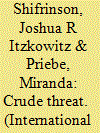| Srl | Item |
| 1 |
ID:
105981


|
|
|
|
|
| Publication |
2011.
|
| Summary/Abstract |
The United States and its Persian Gulf allies have been increasingly concerned with the growing size and complexity of Iran's ballistic missile programs. At a time when the United States and its allies remain locked in a standoff with Iran over the latter's nuclear program, states around the Persian Gulf fear that Iran would retaliate for an attack on its nuclear program by launching missiles at regional oil installations and other strategic targets. An examination of the threat posed by Iran's missiles to Saudi Arabian oil installations, based on an assessment of Iran's missile capabilities, a detailed analysis of Saudi Arabian oil infrastructure, and a simulated missile campaign against the network using known Iranian weapons, finds no evidence of a significant Iranian missile threat to Saudi infrastructure. These findings cast doubt on one aspect of the Iranian threat to Persian Gulf oil while offering an analytic framework for understanding developments in the Iranian missile arsenal and the vulnerability of oil infrastructure to conventional attack.
|
|
|
|
|
|
|
|
|
|
|
|
|
|
|
|
| 2 |
ID:
145228


|
|
|
|
|
| Summary/Abstract |
Did the United States promise the Soviet Union during the 1990 negotiations on German reunification that NATO would not expand into Eastern Europe? Since the end of the Cold War, an array of Soviet/Russian policymakers have charged that NATO expansion violates a U.S. pledge advanced in 1990; in contrast, Western scholars and political leaders dispute that the United States made any such commitment. Recently declassified U.S. government documents provide evidence supporting the Soviet/Russian position. Although no non-expansion pledge was ever codified, U.S. policymakers presented their Soviet counterparts with implicit and informal assurances in 1990 strongly suggesting that NATO would not expand in post–Cold War Europe if the Soviet Union consented to German reunification. The documents also show, however, that the United States used the reunification negotiations to exploit Soviet weaknesses by depicting a mutually acceptable post–Cold War security environment, while actually seeking a system dominated by the United States and opening the door to NATO's eastward expansion. The results of this analysis carry implications for international relations theory, diplomatic history, and current U.S.-Russian relations.
|
|
|
|
|
|
|
|
|
|
|
|
|
|
|
|
| 3 |
ID:
175625


|
|
|
|
|
| Summary/Abstract |
When and why did the United States first contemplate NATO’s enlargement into Eastern Europe? Existing research generally portrays U.S. backing for NATO enlargement as a product of the policy debates and particular beliefs inside the William Clinton administration (1993–2001) starting in the mid-1990s. New evidence, however, shows that U.S. backing for enlargement began earlier, under the preceding George H.W. Bush administration (1989–1993). Moreover, the Bush administration favored enlargement for fundamentally realpolitik reasons, viewing it as a way of sustaining U.S. preeminence and suppressing challengers in post-Cold War Europe. The results carry implications for historiography, foreign policy, and international relations theory.
|
|
|
|
|
|
|
|
|
|
|
|
|
|
|
|